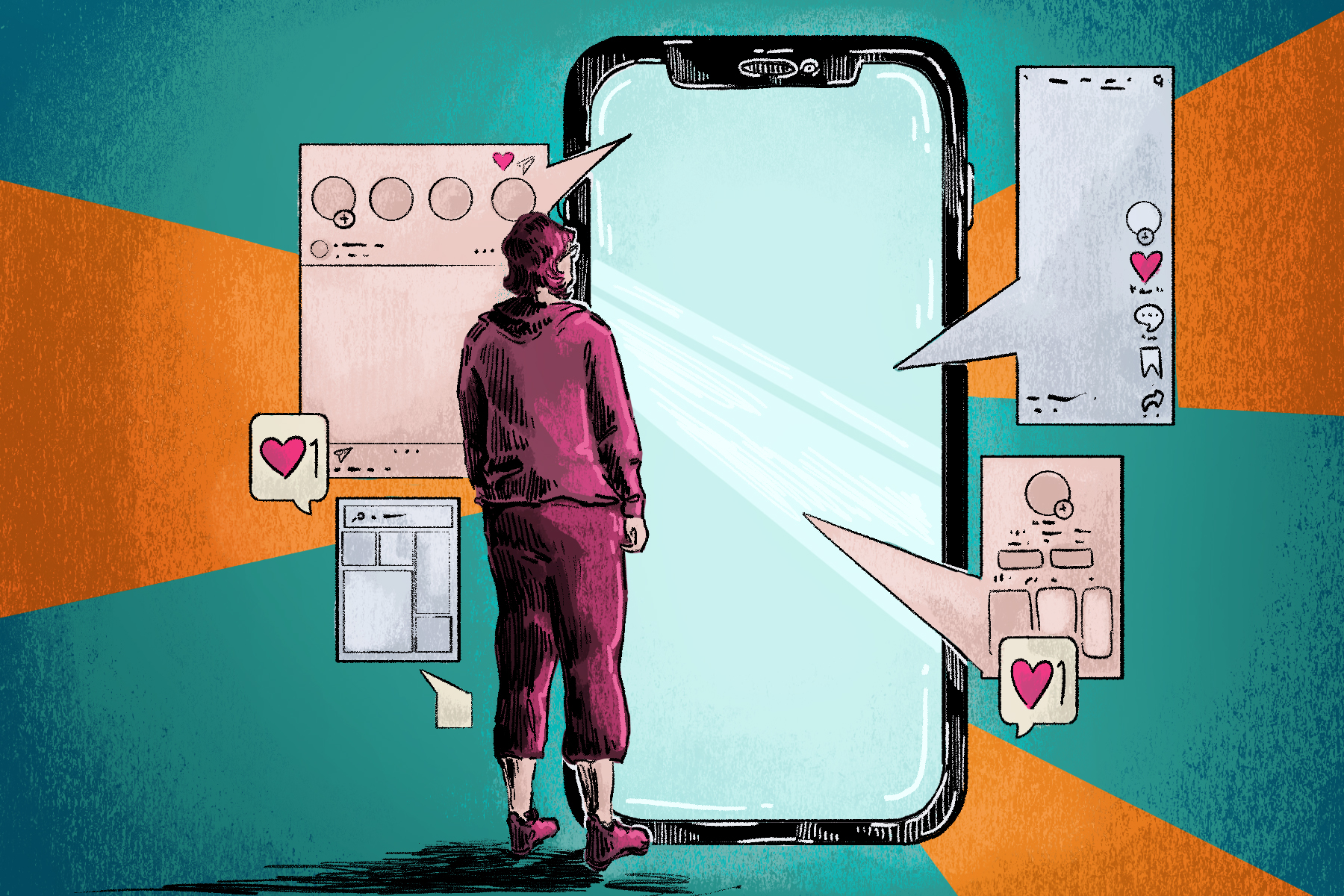I often think of my life pre-internet. Perhaps I hadn’t yet emerged into the dull reality of adulthood, but the world seemed brighter. There are a variety of factors that contributed to my relationship with my phone developing into what it is today. There are many reasons why I struggle to reduce my screen time. A significant culprit are the mental ups and downs from living through the COVID-19 pandemic while graduating high school. Prior to that, my attachment to my phone wasn’t the dire issue that many adults around me saw it as.
Now, I can recognize that my compulsion to pick up my phone is a reaction to anxiety, a way to distract myself from reality. Every video I scrolled through on TikTok was a game of Russian roulette – will the algorithm present me with a video that is funny enough to distract me or one that reminds me of depressing politics, reigniting my anxiety? This landed me in an endless loop of scrolling, increasing my screen time to an average of over 10 hours a day.
Today, I find myself constantly reaching for Instagram and feeling guilt every time. I remember how I used to appreciate nice weather and a book. I would go for walks and notice the little things that brought me joy, such as the way my neighbors’ holiday lights glowed in the winter or the ripeness of the orange trees in the spring. I would watch long movies and contemplate the meaning for hours afterward. Now, I catch myself watching short-form videos instead of engaging in my other hobbies, causing my attention span to diminish. I’m wasting my time with each hour I add to my daily screen time.
I weaned myself off TikTok two years ago; however, Instagram’s competing algorithm “Reels” sparks my doom-scrolling in the exact same way. I indulge in it to relieve the anxiety college causes, and I am left with nothing but even more anxiety by the time I’m finally able to force myself off my phone.
Seeking advice on how to reduce my screen time, I researched the issue. I realized I was not alone in this struggle, despite feeling as if my peers ignored it. In fact, data from all over the world explored a variety of reasons why it feels so impossible to stay in the moment – the most notable being addiction.
A 2016 review article by psychology faculty from the Biomedical Research Institute of Málaga and the Complutense University of Madrid describe addiction “as the capacity to get ‘hooked’ on reinforcing behaviors, excessive worry about consumption or behaviors with high positive reinforcement, tolerance, loss of control, and difficulty in avoiding said behavior, despite its negative consequences.” The idea of cell-phone addiction being a real form of behavioral addiction has been widely explored by experts. The article compares similarities between behavioral issues that arise with cell-phone abuse and substance abuse, such as continued use in dangerous or prohibited situations, loss of interest in usual activities and social and familial issues due to inability to control use.
While this knowledge has existed for years now, the issue has worsened due to COVID-19. A multitude of studies on the impact of the pandemic on the screen time of adolescents reveal that prior to the pandemic, a majority of adolescents were failing to meet the recommended two hour screen time limit. Post-pandemic stress exacerbated the situation, and the increased screen time had a negative effect on the subjects’ social and physical well-being.
As cell-phone addiction worsened, the use of TikTok grew. Many have discussed the possible negative effects TikTok has on teens’ health. University of Southern California professor of sociology Dr. Julie Albright describes the sensation scrolling through TikTok incites in a 2020 interview with Forbes, “In psychological terms, [it’s] called random reinforcement. It means sometimes you win, sometimes you lose. And that’s how these platforms are designed… they’re exactly like a slot machine.”
A New York Times article from 2023 states that TikTok is used by two-thirds of the American population, and the average user spends an average of 93 minutes on the app. The article explores the company’s new implementation of a 60 minute time limit for users under the age of 18. What they found was that this limit is easily avoidable with just a few taps.
This is the problem that arises with every so-called “solution” to the issue. Many think that a simple fix such as a screen time limit will stop adolescents from indulging in their phone. Many still fear to admit that this is a common addiction amongst young people, and addictions never have an easy fix. The issue needs to be addressed at its root.
In a 2022 study of a group of 18 Indonesian “TikTok addicted” adolescents, it was found that implementing cognitive behavioral counseling with the self-instruction method decreased their level of TikTok addiction. “The use of the self-instruction method is a student learning method for changing disturbing (maladaptive) cognitive distortions through self-instruction (self-observation, self-internal dialogue, and coping skills).”
For people who are ashamed of their excessive screen time, they have to reexamine their core values before enacting change. Taking a step back and evaluating the sensations that are missing when living a life dependent on a cellphone is a crucial first step to breaking free from the addiction.
While I continue to struggle, I have started to remind myself of why I started using social media in the first place: I wanted to feel seen. This is the mindset that I have begun to dissect. There were moments where it felt impossible to delete Instagram and TikTok. My anxiety told me that no longer having a presence on social media meant I would be forgotten. Having the courage to tap “delete” has made me realize I had substituted my presence in reality with my presence on my phone. If I just look up from my phone, there are so many opportunities, real experiences and connections that I can take advantage of. A 2023 study on the effect of turning cell-phone screens to grayscale on the amount of screen time with adolescents acts as an interesting metaphor for the situation at hand. The study showed that students who had their screens changed to grayscale had a decreased screen time. While at first glance, this may seem depressing, to no longer experience color through our phones, it also acts as a wake up call. It shouldn’t matter what colors appear on our phones when the real, physical world that surrounds us is full of color and is worth appreciating. Perhaps this is the next step I will take to being more present in reality, and the world will, once again, feel brighter.
















